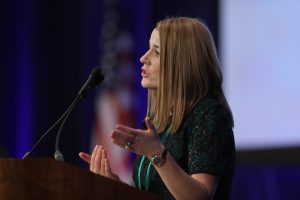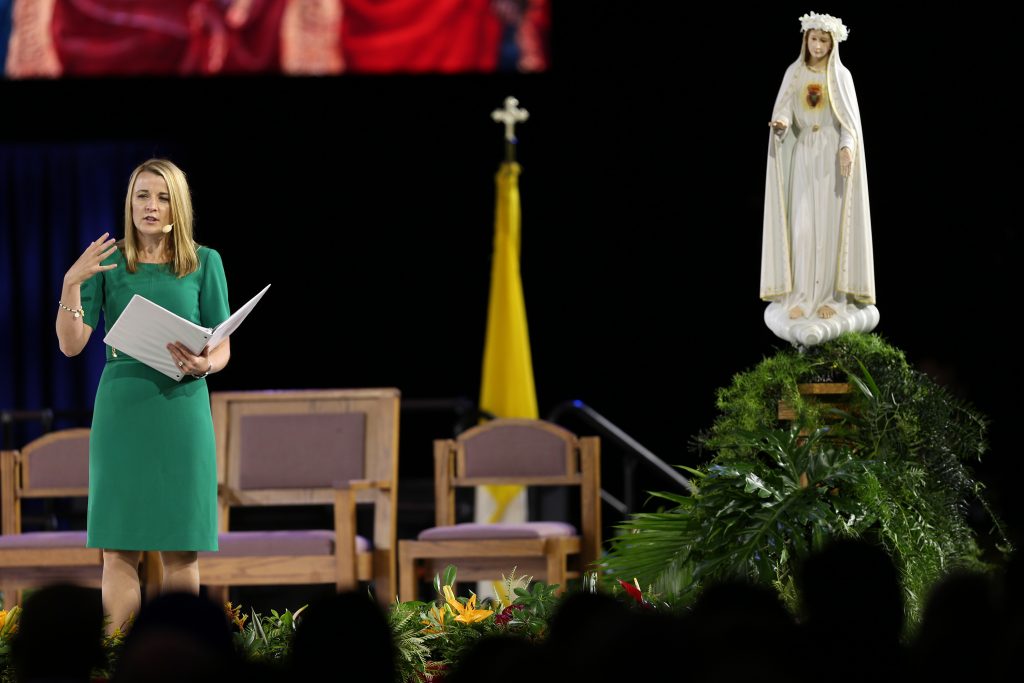Ahead of this year's Religious Education Congress, Angelus News heard from three featured speakers. This is the second of the three-part series. You can read part one here.
Although born and raised in her native Ireland, mother of three Julianne Stanz now lives and works in a very different part of the world: Green Bay, Wisconsin, where she serves as director of Discipleship and Leadership Development for the city’s Catholic diocese.
Her insights on evangelization have brought her not only to the Religious Education Congress in recent years, but also to meetings of the U.S. Conference of Catholic Bishops, whom she advises on catechesis and evangelization.
What have your past experiences at the Religious Education Congress been like, and why are you back this year?
I have spoken several times at the congress through the years and have always appreciated the opportunity to learn from the wisdom of others such as Cardinal Luis Tagle, Sister Briege McKenna and other speakers from around the world. The congress has always provided me with lots of ideas for ministry and connected me with others in the work of evangelization and discipleship.
This year, the congress is doing something a little different with its Friday keynote talk. Instead of having one person address the audience, there will instead be a keynote consisting of five presenters, including myself, sponsored by Loyola Press on the topic of my new book “Start with Jesus.”
In addition, I will also be emceeing a conversation between Archbishop Gomez and Archbishop Christoph Pierre, the apostolic nuncio to the U.S., on Saturday morning, and I will present later in the afternoon on the topic of spiritual self-care.
Finally, at my Saturday workshop, I hope to create a “space for grace” to have a conversation about healthy spiritual living. I see so many ministers tired and worn out. This workshop will offer participants a place to be renewed and refreshed in their walk as a disciple.

One of the things you’re known for writing and speaking about is the relationship between religious education and evangelization. Both are terms that can be defined broadly and get thrown around a lot in Catholic circles these days. In a few words, how would you define that relationship in a way ordinary Catholics can understand?
We use lots of complex terminology in the Church, which can be off-putting to those who we are trying to reach. I live by the “KISS philosophy” when it comes to breaking down the Church’s teachings for others: Keep it simple, sweetie!
The word evangelize comes from the Greek word meaning “to bring the good news.” Seems simple enough, right? And yet it seems that many Catholics are afraid of the word evangelization and barely use it at all.
“Isn’t there a better word than evangelization?” I have often been asked. “Something not so scary or intimidating, perhaps?” “Maybe we can call it something else?” The word “it” holds the key to why many Catholics find it difficult to share their faith with others: Part of the difficulty lies in thinking about faith in “it” terms rather than in “who” terms.
At the heart of evangelization is nurturing a personal relationship with Christ, who is the same “yesterday and today and forever” (Hebrews 13:8).
Evangelization is the deepest identity of the Church, and so many wonder how does religious education or what is called catechesis fit in? Good question!
The old adage that you shouldn’t “put the cart before the horse” is one that we need to be mindful of when we speak of the relationship between evangelization and catechesis. Both evangelization and catechesis build upon each other and work together in the life of every person to bring him or her to a mature faith. One does not replace the other.
The word “catechesis” comes from the Greek word to “echo” — we echo the teachings of the Church but also the person of Jesus Christ in his message. Evangelization and catechesis are the means by which the Catholic Church passes on the faith from one generation to the next.
Last November, you spoke to the Catholic bishops of the U.S. during their fall meeting in Baltimore as a consultant to the USCCB Committee on Catechesis and Evangelization. What was that like, and what do you hope they took away from your remarks?
Even though I regularly speak across the country, whether it is in a small parish or a room full of bishops, I get very nervous.
I asked the Holy Spirit to be with me during that time, to help others to be open, to give me the words that were needed, but also to give me the strength to keep silent when that is more prudent!
It was a nerve-wracking experience but also bore a lot of fruit. Several bishops contacted me later, sharing insights and wanting to dialogue about my remarks. My main point was that we need to see this as a moment of opportunity to go out to a world that is in need of healing with the merciful love of Jesus. Programs, ideas, events, and plans do not make disciples, people do!
I also shared the point that discipleship is not a program or a class but a way of life and our parishes ought to reflect that reality.

Priests, parents, catechists, even bishops seem to be looking for ways to both keep young people engaged with the Catholic faith and call back those who have strayed or “lapsed.” What, in your opinion, is the first step to take?
We all know that we can no longer sit and wait for people to ring the doorbells of our parishes. Instead, we must go out and encounter all people with the love of Jesus in our hearts. Many people today have never read sacred Scripture or encountered Jesus through the beauty of the Mass.
The first step is to actually take a first step, away from our offices, to where people are. We must be nimble and flexible in employing new ways to encounter people when they present themselves to us. We sometimes tend to shy away from being creative and taking a risk for fear of failure. It is easier to play it safe than to “put ourselves out there.”
But when you consider the experiences of the early Church, particularly St. Paul, who was imprisoned, shipwrecked, and beaten, getting out of our comfort zone is critical if we hope to reach people today! Be bold, keep moving and make noise: those are all things that Pope Francis is asking us to do.

